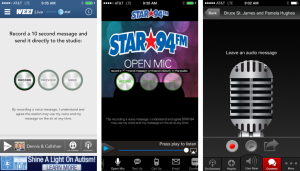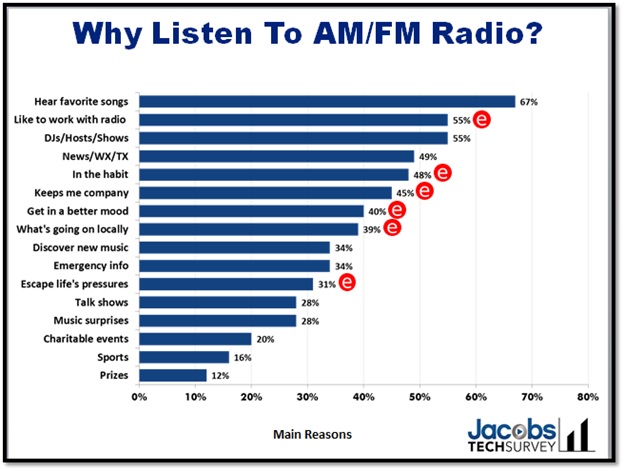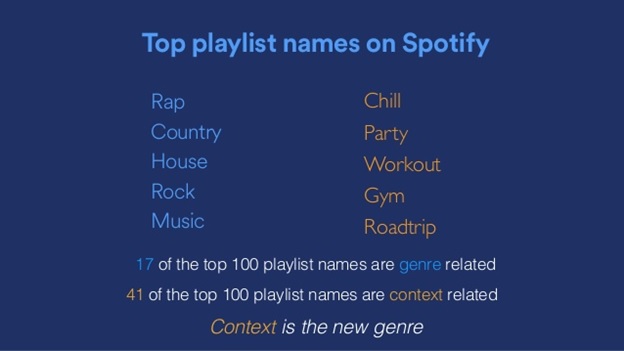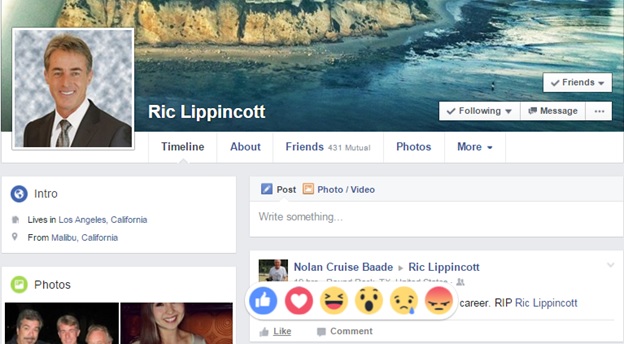The sad passing of Ric Lippincott last week reminds us that life is fleeting and does not always go as planned. In watching reactions on Facebook, I was struck by the outpouring of passion – gratefulness, sadness – expressed by the many who worked with Ric over the years.
When he programmed WLS-FM in Chicago, I did some research for the station and had the chance to get to know him. The longer you work in this business and the older you get, the more these moments begin to pile up. Today, we have social media in which to express our emotions, as part of a larger community of friends, family, and co-workers of those who are no longer with us.
But as cathartic as social media can be, the passing of a friend, family member, or colleague also illustrate the limitations of platforms like Facebook to convey people’s true feelings – especially when users default to the simple click of a “Like.” That’s been on the mind of Mark Zuckerberg and the Facebook team for many years now.
Segue over to radio. In many ways, radio is truly an emotional business where its real impact cannot be adequately measured by metrics like reach and frequency. Readers of this blog know that one of the major takeaways from our recent Techsurveys is the notion that great radio brands offer more than just a music service or topical personality shows.
(BTW, Techsurvey12 is out of the field. The executive summary will be presented for the first time at the Worldwide Radio Summit in L.A. in April. Details here.)
Consumers rely on our radio stations for more than just utilitarian purposes. In fact, stations that truly understand the jobs listeners hire them to do go well beyond executing a format. These are the brands that truly fill an audience need.
They provide emotional sustenance that spans the rainbow of attitudes, feelings, and moods. Radio is about companionship, a sense of time and place, mood elevation, escape, and other less-defined qualitative benefits that you just won’t find in a Nielsen ranker. When radio is on its game, its ability to deliver these emotional benefits trumps cume, quarter-hour, and the number of weekly occasions.
The pure-plays realize that, too. Our Radio’s Most Innovative interview with Spotify’s Paul Lamere last year revealed their users are more likely to name their playlists around mood rather than format genre.
As Lamere told us, “If you look at the top 100 most frequently occurring titles, the majority of them are not genres but context – like “Workout” or “Running” or “Driving” or “Commuting” or “Studying” or “Focus.” So that really points to people using music very contextually.”
Clearly, digital brands are learning what we’ve known in radio all along – there are unmeasurable emotional benefits one derives from a connection to a station, a DJ, or a talk show host. And try as they may, Spotify, Pandora, and even Facebook struggle with how to convey those same feelings through their algorithms and emojis.
And so that leads us to the newest Facebook tweak, the variation on the storied “Like” button. We’ve all been through the weird discomfort of seeing a status update about the death of a loved one or the loss of a job, and the conundrum of how to respond.
Clearly, a comment is in order. But in our frenzied, hurried lives, many prefer a one-click response as they scroll through their News Feeds. Somehow, a “Like” when a good friend loses her 14 year-old Labrador retriever just doesn’t feel adequate or even appropriate.
So now, if you hover over that “Like” button, a range of options called “Reactions” pop up, allowing the user a choice of emotional responses lin the form of emojis like you see on Ric’s page (bottom right):
These emojis are time-saving substitutes. Yet, they still fail to deliver the essence of what people may be trying to express. Of course, it just takes a few moments to bypass these little symbols, and actually leave a heartfelt comment for Ric’s family and friends.
The limitations of social media as an “emotional rescuer” should serve as a motivator to everyone on the air, as well as those who manage and coach talent, that the real beauty of radio is its ability to connect with people all over a city or town, bring them together, make them laugh, cry, or think, and move them in some way. There are few media moments as intimate as the one-on-one communication between someone  behind the mic talking to someone else behind the wheel of a car, working in an office cubicle, or riding the train to work.
behind the mic talking to someone else behind the wheel of a car, working in an office cubicle, or riding the train to work.
Of course, the other side of this is radio’s ability to give its audience a voice. While it may vary by format and brand, listener voices on the air (live or recorded), the Open Mic feature on our jācapps mobile apps (at right), or even a “conversation’ on Facebook are all pathways in which an audience can express itself. An obvious outgrowth of the social media explosion is that people want to be heard. Radio has the ability to give them that opportunity.
As digital brands try mightily to provide the emotional sustenance and support that radio offers every day, it also underscores the power and potential of a connected radio brand. It doesn’t show up in a Nielsen ranker or a programmatic buying algorithm, but smart radio sellers and savvy advertisers know it when they see and hear it.
For Facebook, a half dozen emojis is an improvement over the one-size-fits-all “Like” button. But none of these options can touch radio when it’s on its game.
Advantage radio.
An animated version of the Facebook “Reactions” are below:
Email recipients can click here to watch the short video.
- What To Do If Your Radio Station Goes Through A Midlife Crisis - April 25, 2025
- A 2020 Lesson?It Could All Be Gone In A Flash - April 24, 2025
- How AI Can Give Radio Personalities More…PERSONALITY - April 23, 2025







This post relayed the importance to be open and not feel the need to hide behind the icon, the reaction and for those of us in radio, the Microphone. How important that connection is and how it can strengthen relationships when we are at our true emotions. Thanks for sharing what I sense is a true emotional response to Ric’s passing and doing what he obviously did in his radio career but his flying as well. He was at most himself and that’s why so many people feel his loss and remember his connection.
Appreciate the comment and the thoughts, Andy. Tic will be missed by many.